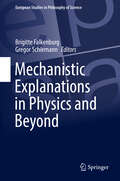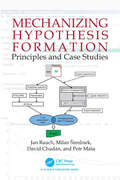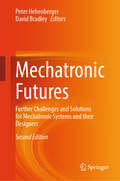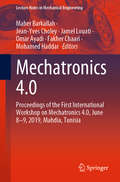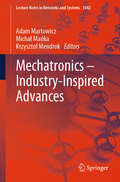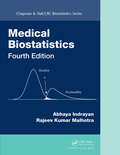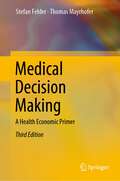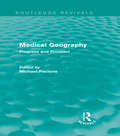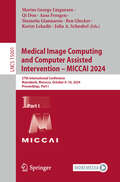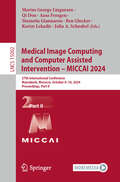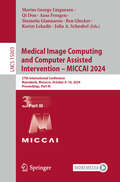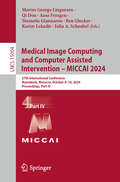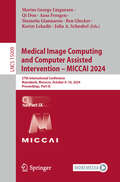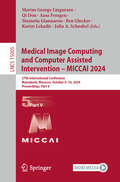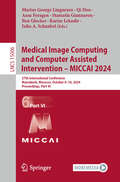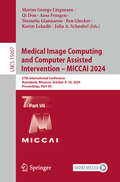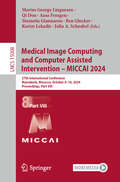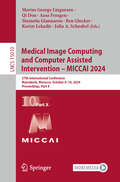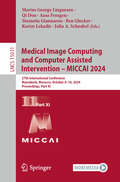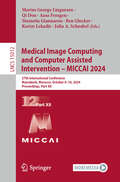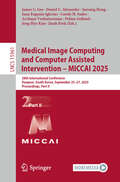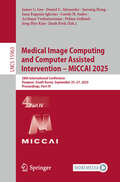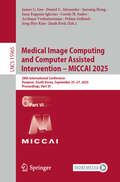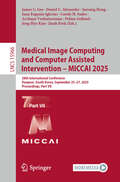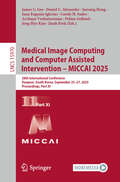- Table View
- List View
Mechanistic Explanations in Physics and Beyond (European Studies in Philosophy of Science #11)
by Brigitte Falkenburg Gregor SchiemannThis volume offers a broad, philosophical discussion on mechanical explanations. Coverage ranges from historical approaches and general questions to physics and higher-level sciences . The contributors also consider the topics of complexity, emergence, and reduction. Mechanistic explanations detail how certain properties of a whole stem from the causal activities of its parts. This kind of explanation is in particular employed in explanatory models of the behavior of complex systems. Often used in biology and neuroscience, mechanistic explanation models have been often overlooked in the philosophy of physics. The authors correct this surprising neglect. They trace these models back to their origins in physics. The papers present a comprehensive historical, methodological, and problem-oriented investigation. The contributors also investigate the conditions for using models of mechanistic explanations in physics. The last papers make the bridge from physics to economics, the theory of complex systems and computer science . This book will appeal to graduate students and researchers with an interest in the philosophy of science, scientific explanation, complex systems, models of explanation in physics higher level sciences, and causal mechanisms in science.
Mechanizing Hypothesis Formation: Principles and Case Studies
by Jan Rauch Milan Šimůnek David Chudán Petr MášaMechanizing hypothesis formation is an approach to exploratory data analysis. Its development started in the 1960s inspired by the question “can computers formulate and verify scientific hypotheses?”. The development resulted in a general theory of logic of discovery. It comprises theoretical calculi dealing with theoretical statements as well as observational calculi dealing with observational statements concerning finite results of observation. Both calculi are related through statistical hypotheses tests. A GUHA method is a tool of the logic of discovery. It uses a one-to-one relation between theoretical and observational statements to get all interesting theoretical statements. A GUHA procedure generates all interesting observational statements and verifies them in a given observational data. Output of the procedure consists of all observational statements true in the given data. Several GUHA procedures dealing with association rules, couples of association rules, action rules, histograms, couples of histograms, and patterns based on general contingency tables are involved in the LISp-Miner system developed at the Prague University of Economics and Business. Various results about observational calculi were achieved and applied together with the LISp-Miner system. The book covers a brief overview of logic of discovery. Many examples of applications of the GUHA procedures to solve real problems relevant to data mining and business intelligence are presented. An overview of recent research results relevant to dealing with domain knowledge in data mining and its automation is provided. Firsthand experiences with implementation of the GUHA method in the Python language are presented.
Mechatronic Futures: Further Challenges and Solutions for Mechatronic Systems and their Designers
by David Bradley Peter HehenbergerThis book, a new and revised edition of “Mechatronic Futures”, sets out to identify and discuss the key issues likely to impact on the design and implementation of future mechatronic systems. In doing so, it offers a comprehensive overview of the challenges, risks and options that define the future of mechatronics and provides insights into how these issues are currently being assessed and managed. The book aims to support mechatronics practitioners in identifying key areas in design, modelling and technology and to place these in the wider context of concepts such as cyber-physical systems, Digital Twins and the Internet of Things and alongside issues such as privacy, security and sustainability. For educators, it considers the potential effects of developments in these areas on mechatronic course design, and ways of integrating these. Written by experts in the field, it explores topics including systems integration, design, modelling, privacy, ethics, lifecycle monitoring, sustainability and other potential future application domains. This new edition contains many new chapters as well as updated and revised chapters from the previous edition, and takes into account how recent significant developments in artificial intelligence and cyber-security are changing how current mechatronic systems are designed, manufactured, operated, used and potentially recycled. Highlighting novel innovations and directions, the book is intended for academics, engineers, managers, researchers and students working in the field of mechatronics, particularly those developing new concepts, methods and ideas.
Mechatronics 4.0: Proceedings of the First International Workshop on Mechatronics 4.0, June 8–9, 2019, Mahdia, Tunisia (Lecture Notes in Mechanical Engineering)
by Jean-Yves Choley Fakher Chaari Mohamed Haddar Maher Barkallah Jamel Louati Omar AyadiThis book gathers original findings, both theoretical and experimental, related to various cutting-edge topics in the design and modeling of mechatronic systems, including multiphysics problems. It presents peer-reviewed papers from the first installment of the Mechatronics 4.0 workshop, which was jointly organized by the Laboratory of Mechanics, Modeling and Manufacturing (LA2MP), National School of Engineers of Sfax, Tunisia, and the QUARTZ Laboratory, Higher Institute of Mechanics of Paris, SUPMECA, France. The event follows in the tradition of the Workshop on Mechatronic Systems (JSM2014), organized by the same universities, while shifting the focus to the concept of Industry 4.0. As this new type of industry is emerging as the convergence of the virtual world, digital design, and management with real-world products and objects, the chapters gathered here highlight recent work on mechatronics systems that are expected to help shape the industry of tomorrow. Thanks to a healthy balance of theory and practical findings, the book offers a timely snapshot for the research and industrial communities alike, as well as a bridge to facilitate communication and collaboration between the two groups.
Mechatronics – Industry-Inspired Advances (Lecture Notes in Networks and Systems #1042)
by Adam Martowicz Michał Mańka Krzysztof MendrokThis book addresses the key aspects concerning the rapid development of mechatronics. It also helps to understand the respective great significance of cooperation between researchers and professionals. Mechatronics is crucial for many areas of life. However, its invaluable contribution is particularly seen in the Fourth Industrial Revolution (Industry 4.0). In response to the current issues in mechatronics, the 6th International Conference Mechatronics 2023: Ideas for Industrial Applications was organized from 11 to 13 December 2023 in Krakow, Poland. The following topics were discussed: artificial intelligence, robotics, image processing, software, control systems, space applications, modeling and identification of mechatronic systems, smart materials, and prototype construction with 3D printing. This book provides the solutions ready for implementation in industry. These solutions grew out of the ideas exchange between the Conference attendees representing various backgrounds.
Medical Biostatistics (Chapman & Hall/CRC Biostatistics Series)
by Abhaya Indrayan Rajeev Kumar MalhotraEncyclopedic in breadth, yet practical and concise, Medical Biostatistics, Fourth Edition focuses on the statistical aspects ofmedicine with a medical perspective, showing the utility of biostatistics as a tool to manage many medical uncertainties. This edition includes more topics in order to fill gaps in the previous edition. Various topics have been enlarged and modified as per the new understanding of the subject.
Medical Decision Making: A Health Economic Primer
by Stefan Felder Thomas MayrhoferThis textbook offers a comprehensive analysis of medical decision-making under uncertainty by combining test information theory with expected utility theory. The authors show how the parameters of Bayes’ theorem can be combined with a value function of health states in order to arrive at informed test and treatment decisions in the face of diagnostic and therapeutic risks. Distinguishing between risk-neutral, risk-averse, and prudent decision-makers, they demonstrate the effects of risk preferences on medical decisions. Furthermore, they analyze individual and multiple tests as well as diagnostic models in which the decision-maker chooses the test outcome. The consequences of test and treatment decisions for the patient are encompassed by quality-adjusted life years (QALYs) and the standard economic model, which applies the willingness to pay for health approach. Lastly, non-expected utility models of choice under risk and uncertainty are presented. Although these models can explain some of the test and treatment decisions observed, they are less suitable for normative analyses aimed at providing guidance on medical decision-making. This third edition provides extensively revised versions of all chapters and reflects recent innovations in medical decision-making such as decision curve analysis. New chapters focus on the health economics of and revealed preferences in medical decisions. The book is intended for students of (health) economics and medicine as well as for medical decision-makers and physicians dealing with uncertainty in their test and treatment decisions.
Medical Geography: Progress and Prospect (Routledge Revivals)
by Michael PacioneGeographers have for a long time contributed much valuable detailed data on the geographical patterns of disease and health care delivery to the medical world. On its first publication in 1985, this edited collection addressed the need for a review of progress in the field of medical geography that could also shape further developments. Topics under discussion include national systems of health care, the utilisation of health services, medical planning and medical geography in the developing world. This is a comprehensive volume that is it still of great relevance to today’s students of medical geography, health care and demography.
Medical Image Computing and Computer Assisted Intervention – MICCAI 2024: 27th International Conference, Marrakesh, Morocco, October 6–10, 2024, Proceedings, Part I (Lecture Notes in Computer Science #15001)
by Marius George Linguraru Aasa Feragen Ben Glocker Julia A. Schnabel Karim Lekadir Qi Dou Stamatia GiannarouThe 12-volume set LNCS 15001 - 15012 constitutes the proceedings of the 27th International Conferenc on Medical Image Computing and Computer Assisted Intervention, MICCAI 2024, which took place in Marrakesh, Morocco, during October 6–10, 2024. MICCAI accepted 857 full papers from 2781 submissions. They focus on neuroimaging; image registration; computational pathology; computer aided diagnosis, treatment response, and outcome prediction; image guided intervention; visualization; surgical planning, and surgical data science; image reconstruction; image segmentation; machine learning; etc.
Medical Image Computing and Computer Assisted Intervention – MICCAI 2024: 27th International Conference, Marrakesh, Morocco, October 6–10, 2024, Proceedings, Part II (Lecture Notes in Computer Science #15002)
by Marius George Linguraru Aasa Feragen Ben Glocker Julia A. Schnabel Karim Lekadir Qi Dou Stamatia GiannarouThe 12-volume set LNCS 15001 - 15012 constitutes the proceedings of the 27th International Conferenc on Medical Image Computing and Computer Assisted Intervention, MICCAI 2024, which took place in Marrakesh, Morocco, during October 6–10, 2024. MICCAI accepted 857 full papers from 2781 submissions. They focus on neuroimaging; image registration; computational pathology; computer aided diagnosis, treatment response, and outcome prediction; image guided intervention; visualization; surgical planning, and surgical data science; image reconstruction; image segmentation; machine learning; etc.
Medical Image Computing and Computer Assisted Intervention – MICCAI 2024: 27th International Conference, Marrakesh, Morocco, October 6–10, 2024, Proceedings, Part III (Lecture Notes in Computer Science #15003)
by Marius George Linguraru Aasa Feragen Ben Glocker Julia A. Schnabel Karim Lekadir Qi Dou Stamatia GiannarouThe 12-volume set LNCS 15001 - 15012 constitutes the proceedings of the 27th International Conferenc on Medical Image Computing and Computer Assisted Intervention, MICCAI 2024, which took place in Marrakesh, Morocco, during October 6–10, 2024. MICCAI accepted 857 full papers from 2781 submissions. They focus on neuroimaging; image registration; computational pathology; computer aided diagnosis, treatment response, and outcome prediction; image guided intervention; visualization; surgical planning, and surgical data science; image reconstruction; image segmentation; machine learning; etc.
Medical Image Computing and Computer Assisted Intervention – MICCAI 2024: 27th International Conference, Marrakesh, Morocco, October 6–10, 2024, Proceedings, Part IV (Lecture Notes in Computer Science #15004)
by Marius George Linguraru Aasa Feragen Ben Glocker Julia A. Schnabel Karim Lekadir Qi Dou Stamatia GiannarouThe 12-volume set LNCS 15001 - 15012 constitutes the proceedings of the 27th International Conferenc on Medical Image Computing and Computer Assisted Intervention, MICCAI 2024, which took place in Marrakesh, Morocco, during October 6–10, 2024. MICCAI accepted 857 full papers from 2781 submissions. They focus on neuroimaging; image registration; computational pathology; computer aided diagnosis, treatment response, and outcome prediction; image guided intervention; visualization; surgical planning, and surgical data science; image reconstruction; image segmentation; machine learning; etc.
Medical Image Computing and Computer Assisted Intervention – MICCAI 2024: 27th International Conference, Marrakesh, Morocco, October 6–10, 2024, Proceedings, Part IX (Lecture Notes in Computer Science #15009)
by Marius George Linguraru Aasa Feragen Ben Glocker Julia A. Schnabel Karim Lekadir Qi Dou Stamatia GiannarouThe 12-volume set LNCS 15001 - 15012 constitutes the proceedings of the 27th International Conferenc on Medical Image Computing and Computer Assisted Intervention, MICCAI 2024, which took place in Marrakesh, Morocco, during October 6–10, 2024. MICCAI accepted 857 full papers from 2781 submissions. They focus on neuroimaging; image registration; computational pathology; computer aided diagnosis, treatment response, and outcome prediction; image guided intervention; visualization; surgical planning, and surgical data science; image reconstruction; image segmentation; machine learning; etc.
Medical Image Computing and Computer Assisted Intervention – MICCAI 2024: 27th International Conference, Marrakesh, Morocco, October 6–10, 2024, Proceedings, Part V (Lecture Notes in Computer Science #15005)
by Marius George Linguraru Aasa Feragen Ben Glocker Julia A. Schnabel Karim Lekadir Qi Dou Stamatia GiannarouThe 12-volume set LNCS 15001 - 15012 constitutes the proceedings of the 27th International Conferenc on Medical Image Computing and Computer Assisted Intervention, MICCAI 2024, which took place in Marrakesh, Morocco, during October 6–10, 2024. MICCAI accepted 857 full papers from 2781 submissions. They focus on neuroimaging; image registration; computational pathology; computer aided diagnosis, treatment response, and outcome prediction; image guided intervention; visualization; surgical planning, and surgical data science; image reconstruction; image segmentation; machine learning; etc.
Medical Image Computing and Computer Assisted Intervention – MICCAI 2024: 27th International Conference, Marrakesh, Morocco, October 6–10, 2024, Proceedings, Part VI (Lecture Notes in Computer Science #15006)
by Marius George Linguraru Aasa Feragen Ben Glocker Julia A. Schnabel Karim Lekadir Qi Dou Stamatia GiannarouThe 12-volume set LNCS 15001 - 15012 constitutes the proceedings of the 27th International Conferenc on Medical Image Computing and Computer Assisted Intervention, MICCAI 2024, which took place in Marrakesh, Morocco, during October 6–10, 2024. MICCAI accepted 857 full papers from 2781 submissions. They focus on neuroimaging; image registration; computational pathology; computer aided diagnosis, treatment response, and outcome prediction; image guided intervention; visualization; surgical planning, and surgical data science; image reconstruction; image segmentation; machine learning; etc.
Medical Image Computing and Computer Assisted Intervention – MICCAI 2024: 27th International Conference, Marrakesh, Morocco, October 6–10, 2024, Proceedings, Part VII (Lecture Notes in Computer Science #15007)
by Marius George Linguraru Aasa Feragen Ben Glocker Julia A. Schnabel Karim Lekadir Qi Dou Stamatia GiannarouThe 12-volume set LNCS 15001 - 15012 constitutes the proceedings of the 27th International Conferenc on Medical Image Computing and Computer Assisted Intervention, MICCAI 2024, which took place in Marrakesh, Morocco, during October 6–10, 2024. MICCAI accepted 857 full papers from 2781 submissions. They focus on neuroimaging; image registration; computational pathology; computer aided diagnosis, treatment response, and outcome prediction; image guided intervention; visualization; surgical planning, and surgical data science; image reconstruction; image segmentation; machine learning; etc.
Medical Image Computing and Computer Assisted Intervention – MICCAI 2024: 27th International Conference, Marrakesh, Morocco, October 6–10, 2024, Proceedings, Part VIII (Lecture Notes in Computer Science #15008)
by Marius George Linguraru Aasa Feragen Ben Glocker Julia A. Schnabel Karim Lekadir Qi Dou Stamatia GiannarouThe 12-volume set LNCS 15001 - 15012 constitutes the proceedings of the 27th International Conferenc on Medical Image Computing and Computer Assisted Intervention, MICCAI 2024, which took place in Marrakesh, Morocco, during October 6–10, 2024. MICCAI accepted 857 full papers from 2781 submissions. They focus on neuroimaging; image registration; computational pathology; computer aided diagnosis, treatment response, and outcome prediction; image guided intervention; visualization; surgical planning, and surgical data science; image reconstruction; image segmentation; machine learning; etc.
Medical Image Computing and Computer Assisted Intervention – MICCAI 2024: 27th International Conference, Marrakesh, Morocco, October 6–10, 2024, Proceedings, Part X (Lecture Notes in Computer Science #15010)
by Marius George Linguraru Aasa Feragen Ben Glocker Julia A. Schnabel Karim Lekadir Qi Dou Stamatia GiannarouThe 12-volume set LNCS 15001 - 15012 constitutes the proceedings of the 27th International Conferenc on Medical Image Computing and Computer Assisted Intervention, MICCAI 2024, which took place in Marrakesh, Morocco, during October 6–10, 2024. MICCAI accepted 857 full papers from 2781 submissions. They focus on neuroimaging; image registration; computational pathology; computer aided diagnosis, treatment response, and outcome prediction; image guided intervention; visualization; surgical planning, and surgical data science; image reconstruction; image segmentation; machine learning; etc.
Medical Image Computing and Computer Assisted Intervention – MICCAI 2024: 27th International Conference, Marrakesh, Morocco, October 6–10, 2024, Proceedings, Part XI (Lecture Notes in Computer Science #15011)
by Marius George Linguraru Aasa Feragen Ben Glocker Julia A. Schnabel Karim Lekadir Qi Dou Stamatia GiannarouThe 12-volume set LNCS 15001 - 15012 constitutes the proceedings of the 27th International Conferenc on Medical Image Computing and Computer Assisted Intervention, MICCAI 2024, which took place in Marrakesh, Morocco, during October 6–10, 2024. MICCAI accepted 857 full papers from 2781 submissions. They focus on neuroimaging; image registration; computational pathology; computer aided diagnosis, treatment response, and outcome prediction; image guided intervention; visualization; surgical planning, and surgical data science; image reconstruction; image segmentation; machine learning; etc.
Medical Image Computing and Computer Assisted Intervention – MICCAI 2024: 27th International Conference, Marrakesh, Morocco, October 6–10, 2024, Proceedings, Part XII (Lecture Notes in Computer Science #15012)
by Marius George Linguraru Aasa Feragen Ben Glocker Julia A. Schnabel Karim Lekadir Qi Dou Stamatia GiannarouThe 12-volume set LNCS 15001 - 15012 constitutes the proceedings of the 27th International Conferenc on Medical Image Computing and Computer Assisted Intervention, MICCAI 2024, which took place in Marrakesh, Morocco, during October 6–10, 2024. MICCAI accepted 857 full papers from 2781 submissions. They focus on neuroimaging; image registration; computational pathology; computer aided diagnosis, treatment response, and outcome prediction; image guided intervention; visualization; surgical planning, and surgical data science; image reconstruction; image segmentation; machine learning; etc.
Medical Image Computing and Computer Assisted Intervention – MICCAI 2025: 28th International Conference, Daejeon, South Korea, September 23–27, 2025, Proceedings, Part II (Lecture Notes in Computer Science #15961)
by Daniel C. Alexander Archana Venkataraman James C. Gee Polina Golland Carole H. Sudre Jaesung Hong Juan Eugenio Iglesias Jong Hyo Kim Jinah ParkThe 16-volume set LNCS 15960 - 15975 constitutes the refereed proceedings of the 28th International Conference on Medical Image Computing and Computer Assisted Intervention, MICCAI 2025, which took place in Daejeon, South Korea, during September 23–27, 2025. The total of 1027 papers included in the proceedings was carefully reviewed and selected from 3447 submissions. They were organized in topical parts as follows: Part I, LNCS Volume 15960: Multimodal Fusion and Contextual Reasoning in Medical Imaging Part II, LNCS Volume 15961: Surgical Navigation, Scene Understanding, and Video Modeling Part III, LNCS Volume 15962: Learning and Augmented Reality for Surgical and Endoscopic Applications (I) Part IV, LNCS Volume 15963: Learning and Augmented Reality for Surgical and Endoscopic Applications (II) Part V, LNCS Volume 15964: Graph-Based Methods in Medical Imaging Part VI, LNCS Volume 15965: Datasets and Methods for Image Quality Enhancement Part VII, LNCS Volume 15966: Trustworthy and Responsible AI for Medical Imaging Part VIII, LNCS Volume 15967: Multimodal Learning for Diagnosis, Risk Prediction, and Survival Analysis Part IX, LNCS Volume 15968: Core Techniques in Medical Imaging: Segmentation, Registration, Synthesis, Reconstruction, and Other Emerging Methods (I) Part X, LNCS Volume 15969: Core Techniques in Medical Imaging: Segmentation, Registration, Synthesis, Reconstruction, and Other Emerging Methods (II) Part XI, LNCS Volume 15970: Core Techniques in Medical Imaging: Segmentation, Registration, Synthesis, Reconstruction, and Other Emerging Methods (III) Part XII, LNCS Volume 15971: Core Techniques in Medical Imaging: Segmentation, Registration, Synthesis, Reconstruction, and Other Emerging Methods (IV) Part XIII, LNCS Volume 15972: Adapting Foundation Models for Medical Imaging: LLMs, VLMs, and Cross-Domain Generalization (I) Part XIV, LNCS Volume 15973: Adapting Foundation Models for Medical Imaging: LLMs, VLMs, and Cross-Domain Generalization (II) Part XV, LNCS Volume 15974: Adapting Foundation Models for Medical Imaging: LLMs, VLMs, and Cross-Domain Generalization (III) Part XVI, LNCS Volume 15975: Statistical Techniques in Medical Imaging: Causality, Imputation, Weak Supervision, and Other Methods
Medical Image Computing and Computer Assisted Intervention – MICCAI 2025: 28th International Conference, Daejeon, South Korea, September 23–27, 2025, Proceedings, Part IV (Lecture Notes in Computer Science #15963)
by Daniel C. Alexander Archana Venkataraman James C. Gee Polina Golland Carole H. Sudre Jaesung Hong Juan Eugenio Iglesias Jong Hyo Kim Jinah ParkThe 16-volume set LNCS 15960 - 15975 constitutes the refereed proceedings of the 28th International Conference on Medical Image Computing and Computer Assisted Intervention, MICCAI 2025, which took place in Daejeon, South Korea, during September 23–27, 2025. The total of 1027 papers included in the proceedings was carefully reviewed and selected from 3447 submissions. They were organized in topical parts as follows: Part I, LNCS Volume 15960: Multimodal Fusion and Contextual Reasoning in Medical Imaging Part II, LNCS Volume 15961: Surgical Navigation, Scene Understanding, and Video Modeling Part III, LNCS Volume 15962: Learning and Augmented Reality for Surgical and Endoscopic Applications (I) Part IV, LNCS Volume 15963: Learning and Augmented Reality for Surgical and Endoscopic Applications (II) Part V, LNCS Volume 15964: Graph-Based Methods in Medical Imaging Part VI, LNCS Volume 15965: Datasets and Methods for Image Quality Enhancement Part VII, LNCS Volume 15966: Trustworthy and Responsible AI for Medical Imaging Part VIII, LNCS Volume 15967: Multimodal Learning for Diagnosis, Risk Prediction, and Survival Analysis Part IX, LNCS Volume 15968: Core Techniques in Medical Imaging: Segmentation, Registration, Synthesis, Reconstruction, and Other Emerging Methods (I) Part X, LNCS Volume 15969: Core Techniques in Medical Imaging: Segmentation, Registration, Synthesis, Reconstruction, and Other Emerging Methods (II) Part XI, LNCS Volume 15970: Core Techniques in Medical Imaging: Segmentation, Registration, Synthesis, Reconstruction, and Other Emerging Methods (III) Part XII, LNCS Volume 15971: Core Techniques in Medical Imaging: Segmentation, Registration, Synthesis, Reconstruction, and Other Emerging Methods (IV) Part XIII, LNCS Volume 15972: Adapting Foundation Models for Medical Imaging: LLMs, VLMs, and Cross-Domain Generalization (I) Part XIV, LNCS Volume 15973: Adapting Foundation Models for Medical Imaging: LLMs, VLMs, and Cross-Domain Generalization (II) Part XV, LNCS Volume 15974: Adapting Foundation Models for Medical Imaging: LLMs, VLMs, and Cross-Domain Generalization (III) Part XVI, LNCS Volume 15975: Statistical Techniques in Medical Imaging: Causality, Imputation, Weak Supervision, and Other Methods
Medical Image Computing and Computer Assisted Intervention – MICCAI 2025: 28th International Conference, Daejeon, South Korea, September 23–27, 2025, Proceedings, Part VI (Lecture Notes in Computer Science #15965)
by Daniel C. Alexander Archana Venkataraman James C. Gee Polina Golland Carole H. Sudre Jaesung Hong Juan Eugenio Iglesias Jong Hyo Kim Jinah ParkThe 16-volume set LNCS 15960 - 15975 constitutes the refereed proceedings of the 28th International Conference on Medical Image Computing and Computer Assisted Intervention, MICCAI 2025, which took place in Daejeon, South Korea, during September 23–27, 2025. The total of 1027 papers included in the proceedings was carefully reviewed and selected from 3447 submissions. They were organized in topical parts as follows: Part I, LNCS Volume 15960: Multimodal Fusion and Contextual Reasoning in Medical Imaging Part II, LNCS Volume 15961: Surgical Navigation, Scene Understanding, and Video Modeling Part III, LNCS Volume 15962: Learning and Augmented Reality for Surgical and Endoscopic Applications (I) Part IV, LNCS Volume 15963: Learning and Augmented Reality for Surgical and Endoscopic Applications (II) Part V, LNCS Volume 15964: Graph-Based Methods in Medical Imaging Part VI, LNCS Volume 15965: Datasets and Methods for Image Quality Enhancement Part VII, LNCS Volume 15966: Trustworthy and Responsible AI for Medical Imaging Part VIII, LNCS Volume 15967: Multimodal Learning for Diagnosis, Risk Prediction, and Survival Analysis Part IX, LNCS Volume 15968: Core Techniques in Medical Imaging: Segmentation, Registration, Synthesis, Reconstruction, and Other Emerging Methods (I) Part X, LNCS Volume 15969: Core Techniques in Medical Imaging: Segmentation, Registration, Synthesis, Reconstruction, and Other Emerging Methods (II) Part XI, LNCS Volume 15970: Core Techniques in Medical Imaging: Segmentation, Registration, Synthesis, Reconstruction, and Other Emerging Methods (III) Part XII, LNCS Volume 15971: Core Techniques in Medical Imaging: Segmentation, Registration, Synthesis, Reconstruction, and Other Emerging Methods (IV) Part XIII, LNCS Volume 15972: Adapting Foundation Models for Medical Imaging: LLMs, VLMs, and Cross-Domain Generalization (I) Part XIV, LNCS Volume 15973: Adapting Foundation Models for Medical Imaging: LLMs, VLMs, and Cross-Domain Generalization (II) Part XV, LNCS Volume 15974: Adapting Foundation Models for Medical Imaging: LLMs, VLMs, and Cross-Domain Generalization (III) Part XVI, LNCS Volume 15975: Statistical Techniques in Medical Imaging: Causality, Imputation, Weak Supervision, and Other Methods
Medical Image Computing and Computer Assisted Intervention – MICCAI 2025: 28th International Conference, Daejeon, South Korea, September 23–27, 2025, Proceedings, Part VII (Lecture Notes in Computer Science #15966)
by Daniel C. Alexander Archana Venkataraman James C. Gee Polina Golland Carole H. Sudre Jaesung Hong Juan Eugenio Iglesias Jong Hyo Kim Jinah ParkThe 16-volume set LNCS 15960 - 15975 constitutes the refereed proceedings of the 28th International Conference on Medical Image Computing and Computer Assisted Intervention, MICCAI 2025, which took place in Daejeon, South Korea, during September 23–27, 2025. The total of 1027 papers included in the proceedings was carefully reviewed and selected from 3447 submissions. They were organized in topical parts as follows: Part I, LNCS Volume 15960: Multimodal Fusion and Contextual Reasoning in Medical Imaging Part II, LNCS Volume 15961: Surgical Navigation, Scene Understanding, and Video Modeling Part III, LNCS Volume 15962: Learning and Augmented Reality for Surgical and Endoscopic Applications (I) Part IV, LNCS Volume 15963: Learning and Augmented Reality for Surgical and Endoscopic Applications (II) Part V, LNCS Volume 15964: Graph-Based Methods in Medical Imaging Part VI, LNCS Volume 15965: Datasets and Methods for Image Quality Enhancement Part VII, LNCS Volume 15966: Trustworthy and Responsible AI for Medical Imaging Part VIII, LNCS Volume 15967: Multimodal Learning for Diagnosis, Risk Prediction, and Survival Analysis Part IX, LNCS Volume 15968: Core Techniques in Medical Imaging: Segmentation, Registration, Synthesis, Reconstruction, and Other Emerging Methods (I) Part X, LNCS Volume 15969: Core Techniques in Medical Imaging: Segmentation, Registration, Synthesis, Reconstruction, and Other Emerging Methods (II) Part XI, LNCS Volume 15970: Core Techniques in Medical Imaging: Segmentation, Registration, Synthesis, Reconstruction, and Other Emerging Methods (III) Part XII, LNCS Volume 15971: Core Techniques in Medical Imaging: Segmentation, Registration, Synthesis, Reconstruction, and Other Emerging Methods (IV) Part XIII, LNCS Volume 15972: Adapting Foundation Models for Medical Imaging: LLMs, VLMs, and Cross-Domain Generalization (I) Part XIV, LNCS Volume 15973: Adapting Foundation Models for Medical Imaging: LLMs, VLMs, and Cross-Domain Generalization (II) Part XV, LNCS Volume 15974: Adapting Foundation Models for Medical Imaging: LLMs, VLMs, and Cross-Domain Generalization (III) Part XVI, LNCS Volume 15975: Statistical Techniques in Medical Imaging: Causality, Imputation, Weak Supervision, and Other Methods
Medical Image Computing and Computer Assisted Intervention – MICCAI 2025: 28th International Conference, Daejeon, South Korea, September 23–27, 2025, Proceedings, Part XI (Lecture Notes in Computer Science #15970)
by Daniel C. Alexander Archana Venkataraman James C. Gee Polina Golland Carole H. Sudre Jaesung Hong Juan Eugenio Iglesias Jong Hyo Kim Jinah ParkThe 16-volume set LNCS 15960 - 15975 constitutes the refereed proceedings of the 28th International Conference on Medical Image Computing and Computer Assisted Intervention, MICCAI 2025, which took place in Daejeon, South Korea, during September 23–27, 2025. The total of 1027 papers included in the proceedings was carefully reviewed and selected from 3447 submissions. They were organized in topical parts as follows: Part I, LNCS Volume 15960: Multimodal Fusion and Contextual Reasoning in Medical Imaging Part II, LNCS Volume 15961: Surgical Navigation, Scene Understanding, and Video Modeling Part III, LNCS Volume 15962: Learning and Augmented Reality for Surgical and Endoscopic Applications (I) Part IV, LNCS Volume 15963: Learning and Augmented Reality for Surgical and Endoscopic Applications (II) Part V, LNCS Volume 15964: Graph-Based Methods in Medical Imaging Part VI, LNCS Volume 15965: Datasets and Methods for Image Quality Enhancement Part VII, LNCS Volume 15966: Trustworthy and Responsible AI for Medical Imaging Part VIII, LNCS Volume 15967: Multimodal Learning for Diagnosis, Risk Prediction, and Survival Analysis Part IX, LNCS Volume 15968: Core Techniques in Medical Imaging: Segmentation, Registration, Synthesis, Reconstruction, and Other Emerging Methods (I) Part X, LNCS Volume 15969: Core Techniques in Medical Imaging: Segmentation, Registration, Synthesis, Reconstruction, and Other Emerging Methods (II) Part XI, LNCS Volume 15970: Core Techniques in Medical Imaging: Segmentation, Registration, Synthesis, Reconstruction, and Other Emerging Methods (III) Part XII, LNCS Volume 15971: Core Techniques in Medical Imaging: Segmentation, Registration, Synthesis, Reconstruction, and Other Emerging Methods (IV) Part XIII, LNCS Volume 15972: Adapting Foundation Models for Medical Imaging: LLMs, VLMs, and Cross-Domain Generalization (I) Part XIV, LNCS Volume 15973: Adapting Foundation Models for Medical Imaging: LLMs, VLMs, and Cross-Domain Generalization (II) Part XV, LNCS Volume 15974: Adapting Foundation Models for Medical Imaging: LLMs, VLMs, and Cross-Domain Generalization (III) Part XVI, LNCS Volume 15975: Statistical Techniques in Medical Imaging: Causality, Imputation, Weak Supervision, and Other Methods
